
TMJ is short for Temporomandibular Joint. This joint is the sliding hinge-like bone that connects your jawbone to your skull. You have two TMJ joints, each at the side of your skull. TMJ disorders refer to any problems that may affect this joint. TMJ conditions affect the way your jaw moves. They can be difficult to deal with when they affect the way you speak and eat. The causes of TMJ conditions vary.
A jaw injury, infection, arthritis, and genetics are some of the factors that contribute to TMJ disorders. Here are the signs and symptoms of TMJ disorders.
Pain on the Temporal Joint
If you experience pain in your jaw where your jaw meets your temporal bone, then you may have a TMJ disorder. The pain may be on and off. You feel a dull pain that intensifies when you move your jaw. The pain can be in one or both of the joints. If you experience difficulty chewing and speaking you should have your jaw checked out by a physician.
Tenderness in Your Jaw
If you feel a unilateral pain and tenderness in your jaw, seek medical evaluation. This pain presents as chronic pain that radiates in your jaw. The muscle around it feels tender and painful. The pain intensifies when you try to move your jaw. In serious cases, you may experience swelling and internal bleeding.
Jaw Locking
Jaw locking occurs when you open your mouth and you can’t close it. The hinge-like joint on the side of your skull locks and you can’t move your jaw. Sometimes, the jaw locks the mouth shut and you have difficulty opening your mouth.
Pain Around Your Ears
You experience pain around your ears that feel numbing and uncomfortable. Sometimes, this pain feels like a headache that is not localized in a specific place on your head. It can feel like it’s throbbing inside your ears. If the pain keeps intensifying, seek medical intervention.
Teeth Clenching
Excessive teeth clenching and grinding is also a symptom of TMJ disorder. The patient may be clenching and grinding teeth to cope with a painful jaw. Sometimes, the teeth clenching is from non-intentional bruxism tendency, which still indicates the presence of TMJ disorder.
History of Blunt Trauma
Sometimes, people get a hard blow to the head and injure their jaw without knowing. Over time, the injury worsens and your jaw feels different. You may experience a different sensation when opening and closing your mouth. You may feel pain opening and closing your mouth. If you hit your head and your jaw feels different, seek medical intervention.
Clicking Sounds
TMJ disorders can cause clicking sounds in your jaw. If you hear clicking or grinding sounds in your jaw even without pain, it’s an indication that something is not right.
Neck, Shoulder, and Back Pain
Many people don’t know this, but TMJ pain can radiate to your neck and back. Depending on the cause, you may have swelling on your jaw that spreads to the neck. If this happens, then the infection has gone all the way to your glands. Then it’s time to seek medical intervention.
For more information on TMJ Solutions, contact us at Concierge Smile Boutique in Culver City, CA at (424) 404-6400 or text 424-361-6272 to schedule an appointment.







